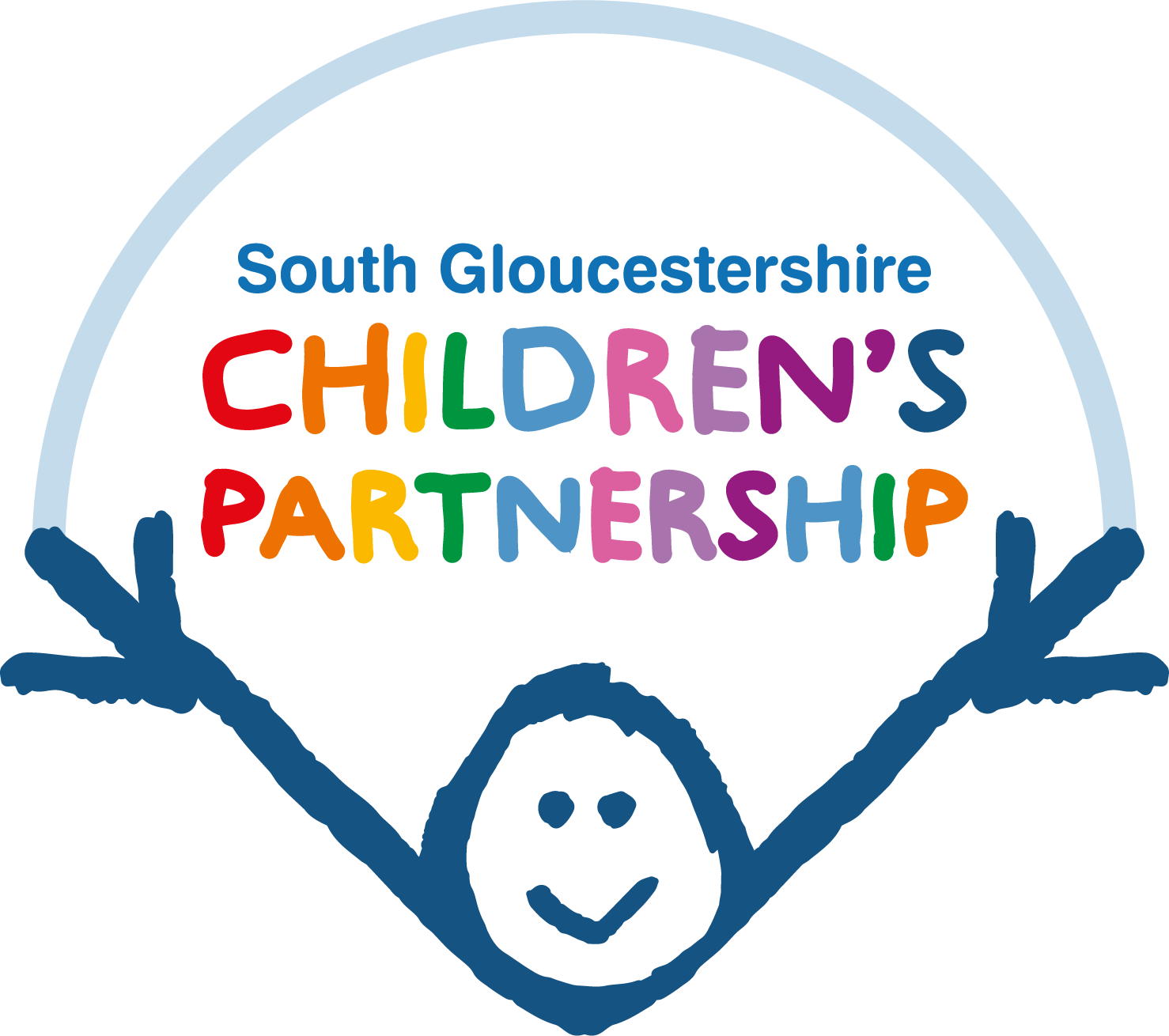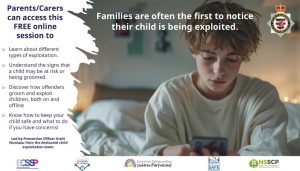Child Exploitation – information for parents and carers
Online Session from Avon & Somerset Police about Child Exploitation for parents – 27th November 2024 8pm- 9pm Join the event here
Go to information about Exploitation for children and young peopleChild Exploitation can happen to any child or young person. This page aims to help parents know what to look out for and when to be worried. There are several different forms of abuse that come under Child Exploitation:
- Child Sexual Exploitation (CSE)
- Child Criminal Exploitation (CCE)
- County Lines
- Serious Youth Violence and Knife Crime
Parents are often the first to notice that their child is being exploited. It is so important to act quickly and intervene early if you suspect your child is being exploited.
In this video, some parents whose children have been exploited talk about the changes they noticed in their child Child exploitation – would you know the signs? (youtube.com)
Child Sexual Exploitation (CSE)
CSE is a type of sexual abuse in which children are sexually exploited for money, power or status.
Parents are often the first to notice something is wrong: trust your instincts and talk to your child if you’re worried:
- Do they have a boyfriend, girlfriend or friends including adults who you don’t know?
- Have you noticed them getting presents, money, a mobile phone or jewellery?
- Have they been missing from home, staying out overnight or missing school?
- Do they get picked up or dropped off by unknown people?
- Are they secretive about where they go and who they see?
- Do they chat to people online who they’ve never met?
- Do you know what they are accessing online?
- Are they drinking or taking drugs regularly?
Children or young people may be tricked into believing they’re in a normal or loving, consensual relationship. They might be invited to parties and given drugs and alcohol. They may also be groomed online.
Child Criminal Exploitation (CCE)
Criminal groups seek out vulnerable children and young people to exploit, manipulating them into thinking the group can meet their needs. They are often befriended first and may initially be asked to carry out simple tasks and bought gifts and food so they are indebted to the group or an individual. They may be groomed and do not realise they are a victim before being asked to carry out criminal activities like carrying or sell drugs. Sometimes they are asked to accept money into their bank account and then send that to another account – this is known as being a Money Mule.
Some facts about exploitation and criminal groups:
- Children and young people have often said they joined these groups for the sense of belonging and protection that they could not find elsewhere.
- Exploitation can happen anywhere to any child but vulnerable children and young people who have conflict at home, are missing school or have mental health issues are more likely to be targeted. Often, they are targeted at parks, bus stops, fast food outlets and online through gaming platforms and social media.
- Children being exploited may be seen as criminals. It is important to recognise them as victims and understand how we can all play a part in preventing them from being forced or coerced into criminal activity or help end their exploitation.
County Lines
County lines is the term used to describe how drug suppliers, usually from urban areas, target more rural areas using dedicated mobile phone numbers or ‘lines’.
Drug dealing, violence and exploitation often go hand in hand with county lines. Commonly young people are drawn into county lines by groups from cities who exploit vulnerable people in their target area. Typically, groups will criminally exploit young and vulnerable people by persuading or forcing them to sell, hold or carry drugs or carry out other criminal activity. Often they will seek to establish a base and take over the home of someone vulnerable by force or coercion – this is known as ‘cuckooing’.
Some facts about county lines:
- Young people aged 14-17 are most likely to be targeted by criminal groups but there are reports of children as young as 6 or 7 being groomed into county lines. To reduce the risk to themselves, dealers use people they think others will not suspect.
- People exploited in this way will often be exposed to physical, mental and sexual abuse or trafficked a long way from home.
- Often the young person being exploited will have been groomed and is not aware they are a victim. They have been given expensive items or cash.
- People can be coerced into county lines online as well as in person, this is especially true since the pandemic.
Serious Youth Violence
South Gloucestershire is a safe place to live and work but incidents of serious violence do occur.
Knife crime in particular has a devastating impact on communities and individuals. South Gloucestershire’s Violence Reduction Partnership, which includes the council’s community safety team, children’s social care, police, schools and other partners, is committed to educating young people about the dangers and impacts of knife crime and is working hard to keep them safe.
In South Gloucestershire, there are also a number of bleed kits which can be used to help save lives in catastrophic trauma incidents and a number of knife surrender bins, where people can place knives and bladed weapons without question or fear of prosecution.
Find out more about the work being done to combat knife crime, and access resources here
Young people decide to carry knives for many reasons – to feel safe, for protection, to earn respect or for their reputation. Whatever the reason, none of them are a defence to carrying a weapon and none of them will stop the carrier from being prosecuted.
In fact, carrying a knife puts you at greater risk of being injured. 7 out of 10 young people who end up in A&E with a knife injury have been stabbed with their own knife. If you carry a knife and end up in an argument, you are also more likely to use it.
Some facts about knives:
- It is a criminal offence to have a blade in a public place, this includes kitchen knives and craft knives
- It is illegal for anyone under 18 to buy a knife of any sort
- Self-defence or protection are not defences to carrying a knife. In fact, you can be prosecuted if someone is stabbed even if you don’t touch the knife but you are there under
- Police can stop and search anyone they believe is carrying a knife
This South Gloucestershire guide to knife harm for parents and carers is the link to the knife crime guide for parents includes facts to help you feel more confident when talking to your child, as well as practical guidance and where to find support.
If your child is in need of immediate support, they can use the following services:
- Young Victims: The Young Victims Service (YVS) provides help and support to young people who have been victims of crime, anti-social behaviour or domestic abuse: www.youngvictims.org.uk
- 2 Wish: Support for those affected by sudden death in young people. England – 2 Wish
- Childline: call 0800 11 11 (under 19)
- Kooth: Online anonymous mental health support for young people www.kooth.com
- Shout: 24/7 support if you need to talk (or text, or online chat): text the word ‘SHOUT’ to 85258
- Samaritans: call 116 123
If your child has information they wish to pass on about a crime: Fearless: Part of Crimestoppers, enables young people to pass on information about crime 100% anonymously: www.crimestoppers-uk.org/fearless
Avon & Somerset Police information on protecting yourself and others from knife crime, including how to surrender a knife in Avon and Somerset is available here

